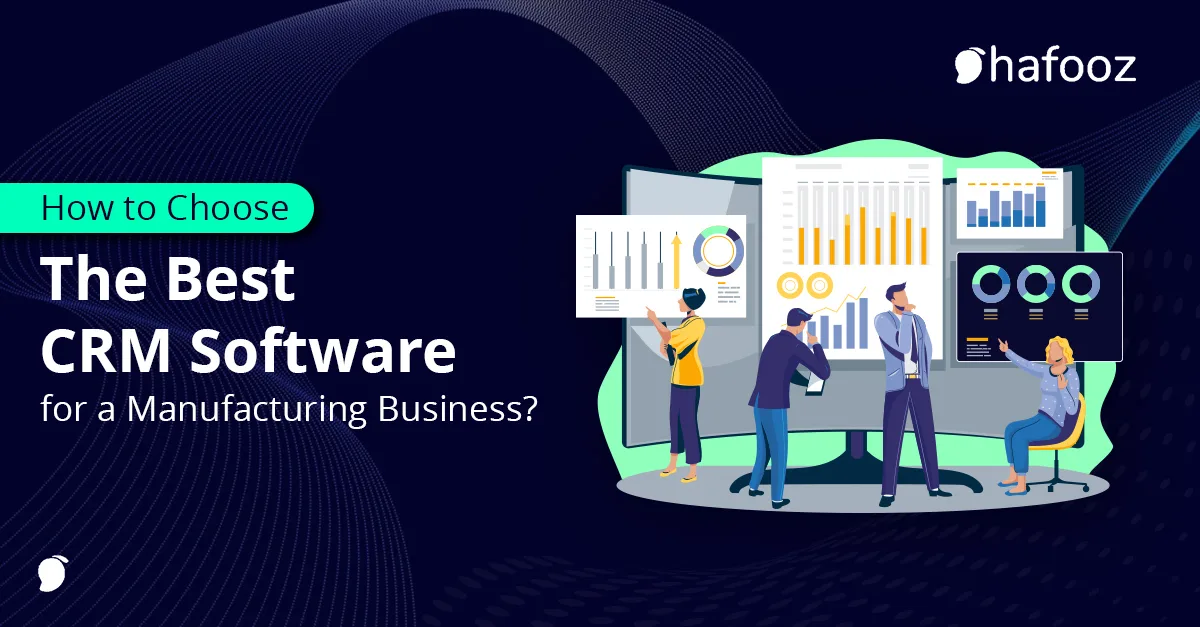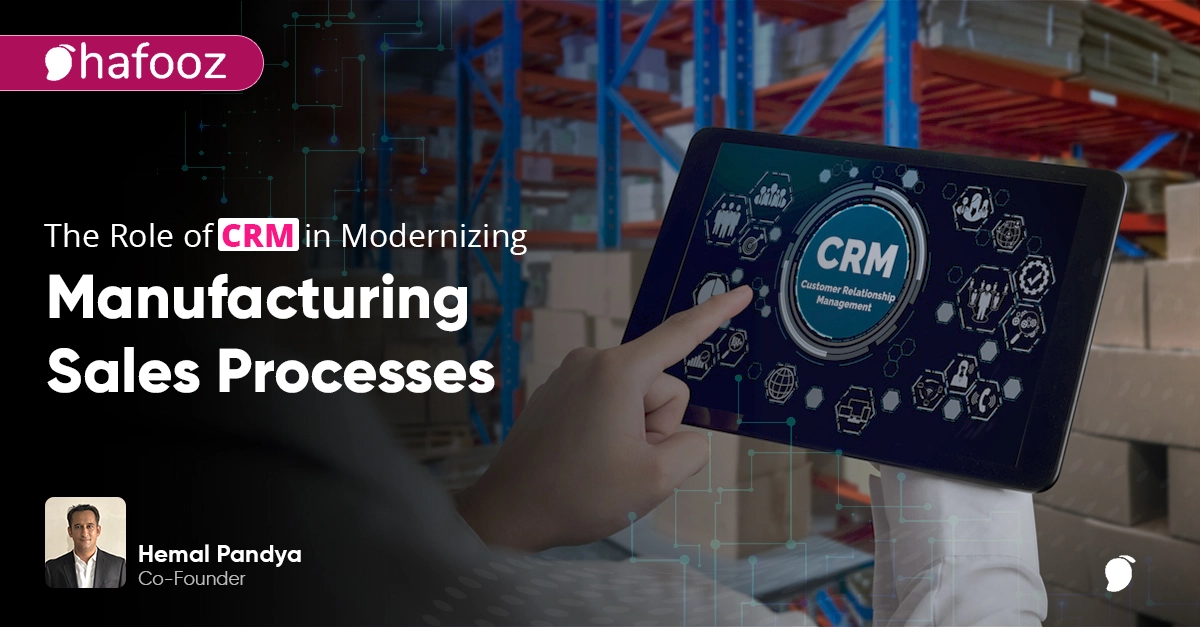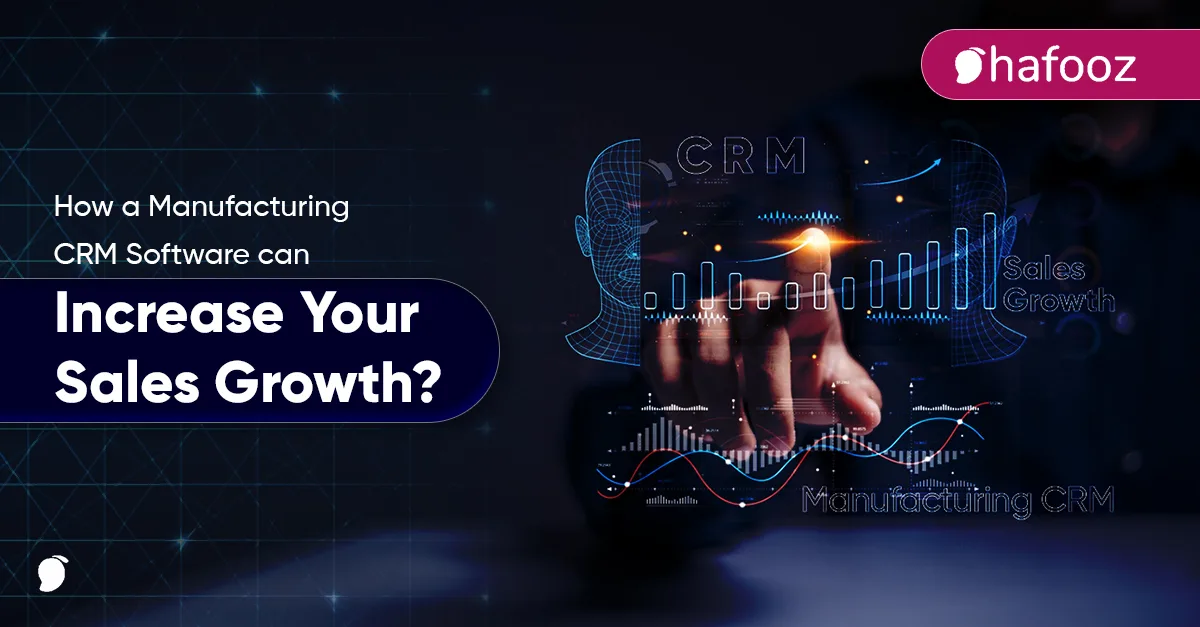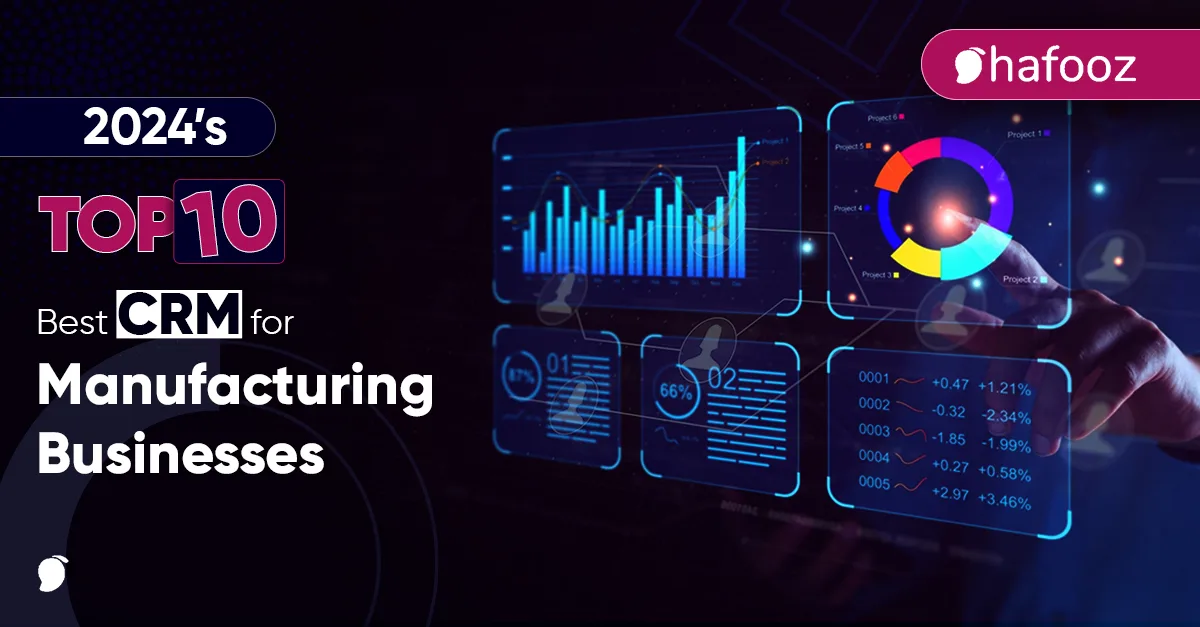In today’s business environment, manufacturing companies always look for ways to streamline operations and enhance customer satisfaction. One effective tool that can help achieve these goals is CRM software.
By implementing CRM software, manufacturing businesses can optimize workflows, improve customer relationship management, and enhance efficiency. However, given the many market options, selecting the CRM software for your manufacturing business can be challenging.
This blog post will explore the factors to consider when choosing CRM software for manufacturing businesses.
What's on this page:
Understanding the Significance of CRM for Manufacturing Businesses
Did you know? Research indicates that businesses that effectively utilize CRM boost sales by 29%. The average ROI for CRM is $8.71 for every dollar spent. These statistics highlight why implementing CRM software in the manufacturing industry is essential
Before delving into the process of selecting CRM software, it is crucial to grasp why CRM holds importance for manufacturing businesses. CRM, which stands for Customer Relationship Management, is a strategy that focuses on establishing and maintaining customer relationships. For manufacturing companies, implementing CRM practices can streamline sales processes, enhance customer support services, and ultimately increase overall customer satisfaction.
Manufacturing companies encounter challenges in today’s highly competitive market. With the increasing demands of customers, intensifying competition, and rapidly evolving technology, it has become crucial for manufacturers to stay ahead of the game. Customer Relationship Management (CRM) software offers manufacturers the tools to effectively manage customer relationships and maintain competitiveness, within the industry.

- Streamlining Sales Processes: One of the advantages that CRM brings to manufacturing businesses is its ability to streamline sales processes. Manufacturers can track leads, manage sales pipelines, and automate sales tasks using CRM software.Many manufacturers miss out on inquiries due to a lack of process and tracking. Having a CRM addresses both as everything goes through a process and there’s a clear track of everything.This saves time and ensures that sales teams focus their efforts on the most promising opportunities. Manufacturers can easily access customer history, preferences, and purchasing patterns through a customer information database. This allows them to tailor their sales approach, significantly increasing their chances of closing deals.
- Enhancing Customer Relationships: Alongside streamlining sales processes, CRM software plays a role in improving customer support for manufacturing businesses. Given that manufacturing often involves products and technical issues, CRM enables the management of customer inquiries by tracking support tickets and providing timely resolutions.By viewing customer interactions, manufacturers can identify recurring issues and address them promptly. This ultimately leads to levels of customer satisfaction and loyalty.
- Improved Customer Satisfaction: CRM software enhances customer satisfaction by providing personalized experiences. Manufacturers can use customer data to segment their customer base and target groups with customized marketing campaigns. This level of personalization not only boosts customer engagement but also increases the chances of customer retention.Furthermore, CRM software empowers manufacturers to collect customer feedback, enabling them to enhance their products and services based on customer preferences and requirements.Integrating CRM software into the manufacturing industry goes beyond competition: it is a decision that can profoundly impact the company’s financial performance. Manufacturers can improve customer retention rates, enhance sales productivity, and ultimately achieve long-term business success by managing customer relationships.
Evaluating the Unique Requirements of Your Manufacturing Business
Each manufacturing business has unique possesses its needs and demands. Therefore, it is vital to evaluate your requirements before choosing CRM software. Start by identifying the pain points and challenges your business currently faces. Are you struggling with lead management? Do you require a system for tracking and managing customer support inquiries? Understanding your needs allows you to narrow down the features and functionalities when selecting CRM software.
When considering the requirements of your manufacturing business, it’s crucial to consider factors like the size of your operation, the complexity of your production processes, and the target market you serve. These factors play a role, in determining the suitable CRM software for your business needs.
For example, if your manufacturing business operates on a scale with production lines and a diverse range of products, you might require CRM software that integrates with ERP software that has advanced inventory management capabilities. This will help you effectively manage materials, finished goods, and work-in-progress items. Moreover, CRM software that supports languages and currencies becomes important if your customer base spans countries.
The Importance of CRM in Lead Management

In the manufacturing industry, effective lead management holds importance. According to research conducted by Salesforce, implementing lead management practices can increase conversion rates by up to 300%. Therefore, selecting CRM software that provides lead management functionalities such as tracking, scoring, and automated nurturing is essential.
These features empower your sales team to focus on leads with conversion potential while enhancing their efficiency and productivity. Additionally, automated lead nurturing is another capability offered by CRM software.
Automating personalized communication with leads is a way to ensure they receive the information at the right time. This can nurture relationships with customers and guide them toward purchasing decisions.
For manufacturing businesses, customer support inquiries can pile up quickly. To efficiently handle these inquiries, it’s essential to choose CRM software that offers features like ticketing systems, case management, and integration with knowledge bases. Managing customer support inquiries effectively can significantly improve customer satisfaction and loyalty.
A ticketing system allows you to track and prioritize customer support inquiries so that each gets addressed promptly. It also enables you to assign team members to handle inquiries, ensuring accountability and efficient resolution. Case management features provide a platform for managing and documenting customer support cases, facilitating collaboration among your team members.
Integration with a knowledge base further streamlines the customer support process. By offering a self-service portal where customers can access FAQs, troubleshooting guides, and instructional materials, you empower them to find solutions to issues independently. This reduces the workload on your support team and enables customers to get the assistance they need quickly and conveniently.
Evaluating the Integration Capabilities of CRM Software with Existing Manufacturing Systems

When it comes to manufacturing companies, it’s essential to ensure that the CRM software you choose seamlessly integrates with your existing manufacturing systems. This integration plays a role in maintaining data and avoiding duplicate entries. It enables real-time information sharing across departments like sales, marketing, and production. Look for CRM software that integrates with used manufacturing systems, such as ERP or inventory management tools.
According to research by Gartner, integrating CRM and ERP systems can lead to a 30% increase in customer retention rates. Moreover, this integration fosters better collaboration between departments and streamlines order management processes. Provides visibility into the supply chain. When assessing CRM software options, consider its compatibility and integration capabilities with your existing manufacturing systems.
As your manufacturing business expands, your CRM requirements will evolve accordingly. That’s why selecting a flexible CRM solution that can grow along with your business and accommodate needs is crucial. Look for a CRM system that allows you to add users, features, and storage capacity as needed. Additionally, having customizable dashboards and workflows can help tailor the CRM software specifically to suit the processes and demands of your manufacturing business.
Did you know? A study conducted by the CIO revealed that 90% of companies that customized their CRM software experienced impacts on their performance. Therefore, choosing a CRM software solution that allows customization and empowers your manufacturing business to adapt and thrive in an evolving industry is crucial.
Identifying Key Features to Consider in CRM Software for the Manufacturing Sector
When searching for CRM software tailored to your manufacturing business, it is essential to consider the features contributing to operations and enhanced customer management.
- 360 Degree Customer View: Opt for a CRM software solution that overviews customer interactions, including purchase history, past inquiries, and preferences. This enables your manufacturing business to personalize customer interactions and deliver experiences.
- Automation: Seek out CRM software that offers automation features such as automatic meeting scheduling, customer call tracking, automated follow-ups, etc. These streamline sales processes and. Improves efficiency and generates more growth.
- Mobile Accessibility: In today’s world, it is imperative to have CRM software accessible on mobile devices. This empowers your sales team with real-time access to customer information and the ability to update data while moving.
- Data & Analytics: When managing your manufacturing business, having CRM software that offers reporting and analytics is crucial. It empowers you to gain insights, spot patterns, and make decisions based on data for driving growth.
- Integration Capabilities: An important factor to consider is whether the CRM software seamlessly integrates with communication channels such as email, phone, and social media. This ensures communication. Captures all interactions in one centralized system.
- User Interface: Additionally, a user-friendly interface is essential for your team members’ adoption and maximum utilization of the CRM software.
- Easy to Customize: CRM software that cannot be customized will never give you 100% satisfaction as every company is unique.
- Role-Based Access: Not everyone needs to know everything. The CRM you choose must allow you to facilitate role-based access of data so that sensitive data isn’t disclosed to everyone.
Considering these features, you can make an educated choice when selecting CRM software for your manufacturing business.
Final Words
In conclusion, choosing the CRM software for your manufacturing business is a decision that can greatly impact your growth, operations, and customer satisfaction. By understanding the significance of CRM, assessing your requirements accurately, evaluating integration capabilities effectively, considering scalability and customization options thoughtfully, and identifying features wisely, you will be well-equipped to make an informed decision.
If you are part of the manufacturing industry seeking a tailor-made CRM solution that caters to your needs, look no further than hafooz. With its AI capabilities, mobile app functionality, AI-powered chatbot assistance, easy-to-customize, and user-friendly interface, hafooz has been specifically designed with the distinct challenges faced by manufacturing businesses in mind.
hafooz offers manufacturers a range of benefits, such as streamlining sales processes, enhancing customer support, and boosting satisfaction through personalized experiences. By choosing hafooz as your CRM tool, you can make a decision that will contribute to the success of your business. Get a free demo to explore its capabilities.








